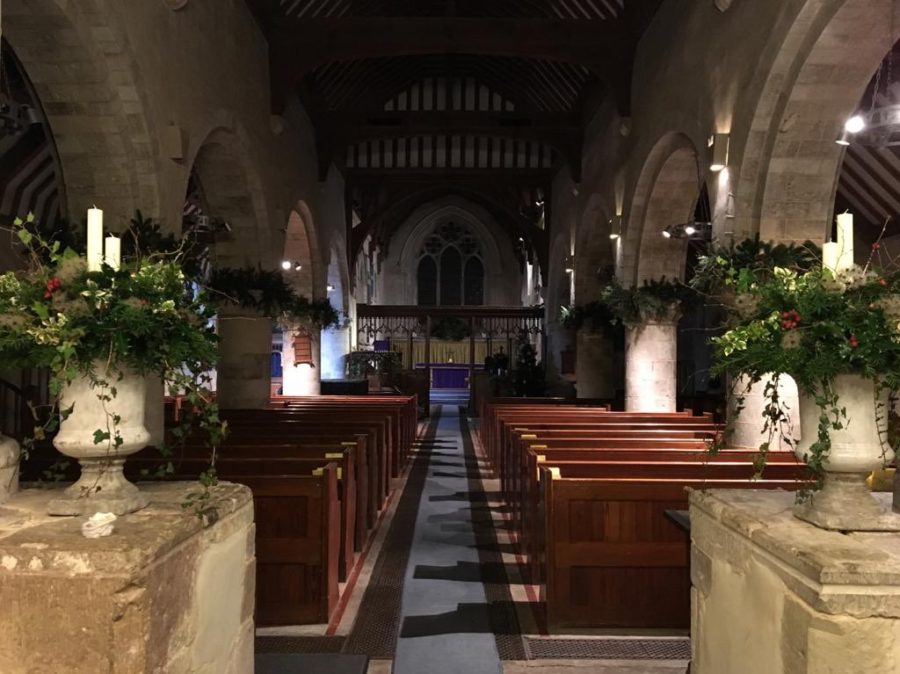21st December 2020 Belgrade, Serbia
Tidings of Comfort and Joy

My mother was one of four sisters. Her favourite book was also a tale about four sisters, Louisa Alcott’s ‘Little Women’. Right up until the end of her long life, though almost blind, my mother could still read and recognise its famous first line:
‘Christmas won’t be Christmas without any presents’.
For many, many people around the world, whether we celebrate Christmas on 25 December, two weeks later according to the Orthodox calendar, or on both days, presents or no presents, Christmas will this year be like no other.
This year only the accomplished online shopper, home baker or needle worker is likely to have all their gift giving needs covered.
For the diplomat abroad, this year with very limited postal or diplomatic bag services, it’s helpful that many people in the UK are happy to be given a virtual ‘present’ such as a charitable donation or a tree planted in a conservation project, instead of a gift in shiny wrapping paper.
Christmas can be Christmas without presents, at least for grown ups.
I’m not sure it would be Christmas for me without music though. Great organ voluntaries in soaring gothic cathedrals, Christmas carols sung in the village church or played by a brass band around the village pond, jolly songs in chaotic family gatherings. This year we will have to book a place in the village church and there are far too many of us to meet up indoors at home as one household.
I’m not sure how much we will be able to sing, but we will certainly be sparing a thought for musicians unable to work at what is often their busiest time of year.
We are very traditional about Christmas food in our family. Goose is more popular than turkey, always eaten with crispy roast potatoes, stuffing made from bread crumbs and herbs, parsnips, Brussels sprouts for those that like them, and loads of gravy.
That’s all followed of course by a dark, dried fruit Christmas pudding, boiled on the stove in a china basin for around 6 hours, and served with flaming brandy or whisky poured over it.
Tangerines too are an essential, nostalgic part of Christmas for a nation that only used to see these bright exotic fruit imported from overseas for a short time in the depth of our grey winter.
This year we have booked a food delivery from our local town two weeks ahead. I hope I haven’t forgotten anything important…
As a diplomat of course I am often not at home in the UK but celebrating Christmas – often both Christmases – abroad. British diplomats and other expats tend to take a lot of our Christmas traditions with us wherever we go. So we make little sweet mince pies with dried fruit, sugar and beef suet, and try to persuade foreign friends to love them as much as we do.
Our children hang up their stockings by the fireplace or the foot of their beds in the certain hope that Father Christmas will find them, wherever they are in the world. They know that when they wake in the early morning they will find them filled with small gifts, probably including chocolate buttons and, of course, a tangerine from those vast stocks that Santa carries through the skies on his reindeer drawn sleigh.
What many of us will miss most though this year is our families. Many have been separated for long, anxious months by travel, quarantine and other public health and practical restrictions.
For me the most evocative line in Christmas literature is not Louisa Alcott’s, but a line from A Child’s Christmas in Wales by Dylan Thomas. “There are always Uncles at Christmas” wrote the great Welsh poet, and he wrote too about aunts, enjoying a tipple of elderberry or parsnip wine. If any of my cousins are reading or listening to this I’m sure that will bring a smile to their faces.
So many people, including diplomats, have lost family members this year because of COVID, or have been unable to spend precious last moments with them. There will be a virtual empty chair at many Christmas dinner tables this year, including mine.
For church goers, Christmas is really about the good news of the nativity and promise for the future. There hasn’t been a lot of good news lately and hope has felt in short supply.
In the UK, the doors of our churches, like other places of worship, have been closed for much of the year to prevent worsening the spread of the coronavirus. Those doors, very cautiously, and with lots of restrictions in place, will now open and their lights on for Christmas.
We do, too, have some new good news for Christmas this year: the astonishingly fast development of several vaccines against COVID-19. In the UK our first healthcare workers and older citizens have been vaccinated with the BioNTech-Pfizer vaccine. My mother in law, who has hardly been beyond her own garden gate for ten months, travelled this week to the city of Portsmouth for her first dose, probably a better Christmas gift than any of us could give.
That first vaccine does need sophisticated delivery and handling systems, but hopefully the AstraZeneca vaccine developed at Oxford University, which is much simpler to produce and to distribute, will also be approved and available soon. In the coming months too the international COVAX facility, supported by many countries including the UK and Serbia, will be working to make sure that vaccines are available all around the world.
So there is hope that life can start returning gradually to normal over the first half of the coming year.
That would be the best present of all. In the words of my favourite Christmas carol: Tidings of comfort and joy.
Merry Christmas!